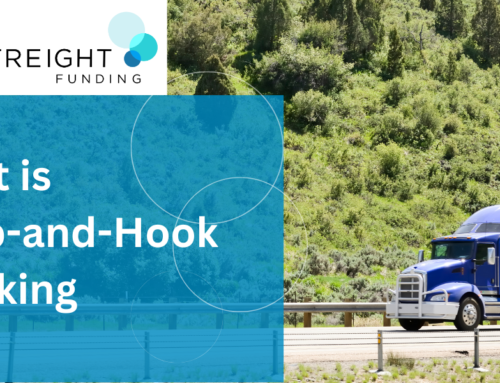Curious how the latest import tariffs might impact your trucking business? While the shift toward domestic sourcing is shaking up freight lanes, it’s also creating new regional and short-haul opportunities for trucking companies. As U.S. manufacturers adapt, industry experts expect the market to find its footing within the year. In the meantime, staying flexible with fleet management and being financially prepared is key. That’s where freight factoring comes in—helping you keep cash flowing, cover expenses, and stay ready to take on new loads as they come. Read on to learn how to stay profitable and navigate the road ahead.
Jump To Section
What is a Tariff? And What’s The Point?
Tariff Definition
A tariff is a tax imposed on goods as they cross national borders.
Global tariffs raise the cost of imported goods, often prompting businesses and consumers to turn to domestic alternatives. While tariffs serve multiple purposes, recent policies have primarily aimed to protect U.S. industries and influence global trade practices. One goal is to reduce reliance on foreign supply chains tied to underpaid or exploitative labor, including child labor. By encouraging the production and purchase of American-made goods, tariffs are intended to boost local manufacturing and strengthen economic independence. But the ripple effects go beyond international trade; import tariffs have a direct and growing impact on the freight market and domestic trucking companies.
How Do Tariffs Affect Trucking?
Import tariff surcharges often hit hardest at the start of the supply chain, prompting many shippers to reduce import freight volumes. As imports decline, freight demand on key lanes drops, creating imbalances across the freight market network. This disruption can lead to inefficient outcomes like deadhead miles or rerouted freight, both of which drive up costs. When shipments are delayed at factories, ports, or warehouses, trucks may be forced to wait or leave empty, wasting valuable time and fuel. To adapt, carriers may need to reposition equipment or chase loads in new regions, adding to operational strain. In response, freight brokers may raise rates to offset reduced volume, longer transit times, or delays at customs. Some may even attempt to renegotiate rate agreements mid-contract to keep up with market volatility.
Real-World Example:
During COVID-19, many trucks arrived at closed factories or ports, had no load to pick up, and had to drive hundreds of miles to the next available shipment.
Worried About Saving Your Business During This Transition?
Tariff-related disruptions like customs holds, rerouting, and slower freight movement can all delay payment cycles. For carriers already under economic strain, these delays can be tough to absorb. Today’s trucking landscape is shaped by a combination of low freight rates, high fuel costs, freight volume declines, tightening credit and capital access, insurance premiums, regulatory burdens (ELD mandates, emission standards, English proficiency, etc), and payment delays for trucking companies. All of these pressures can lead to cash flow struggles when paying drivers, purchasing fuel, and navigating maintenance costs. For many, the added pressure of tariffs only deepens an already fragile financial situation.
That’s where freight factoring comes in. By converting outstanding invoices into immediate cash, factoring helps carriers improve cash flow, without taking on new debt. Porter Freight Funding offers fast, reliable payments on slow-paying invoices, helping carriers stay financially stable and competitive even in a low-volume market. We also offer fuel advances and discounts at major truck stops, giving you more tools to stay on the road and in control.
We understand that some traditional truckers are hesitant. There’s a belief that factoring is a sign of failure, or that it’s an expensive shortcut. But the reality is very different; factoring with Porter Freight is a proactive strategy. It allows you to run credit checks on brokers, protect against non-payment, and access a dedicated collections team when a broker delays or defaults. If you’ve ever hauled a load and waited weeks (or months) for payment, you know how damaging that can be. We’re here to make sure that it doesn’t happen again. We have an amazing collections team ready to help you get back the money you deserve.
How Can Tariffs Help You?
As tariffs make imports more expensive, many manufacturers are reshoring operations to bring production and sourcing closer to home. This shift is expected to boost demand for domestic freight, creating new opportunities for the trucking industry. Instead of relying on ships and planes to move goods internationally, manufacturers will need trucks to haul raw materials and finished products across the country. This transition also opens the door for growth in specialized freight sectors such as agriculture, lumber, and other industrial materials, all of which require reliable over-the-road transportation.
How Are Carriers and Owner-Operators Adapting to Freight Tariffs?
We see carriers shifting away from tariff-affected regions where ports are importing tariffed goods like electronics and steel, and are focusing more on domestic freight lanes. They are seeking contracts with shippers in non-tariffed industries, like agriculture, healthcare, and consumer staples. They are investing in more fuel-efficient trucks, route optimization software, and digital freight platforms to improve fleet management. We see carriers adjusting their routes to avoid high-tariff destinations and diversifying their network partnerships to minimize cost exposure and increase flexibility.
Carriers are turning to freight factoring for immediate cash flow, especially when shippers delay payment due to tight margins. Factoring can also help carriers with vetting new brokers and shippers to ensure they are compliant with regulations.
Stay informed! Monitor tariff announcements and trade policy changes to anticipate shifts. Subscribe to newsletters and check out freight news websites to stay up to date on recent changes.
Summary
- Tariffs are taxes imposed on goods as they cross national borders.
- The most recent tariff purposes were mainly to protect local industries and influence trade policies.
- Tariff-related disruptions like customs holds, rerouting, and slower freight movement can all delay payment cycles.
- With an increased production of American-made goods, this will hopefully lead to an increase in domestic freight volume.
- Porter Freight Funding can provide a steady income stream and help you stay competitive, even in this low-volume environment.
- We see carriers shifting away from tariff-affected regions where ports are importing tariffed goods like electronics and steel, and are focusing more on domestic freight lanes.
Get connected with one of our freight factoring experts today and keep your business running despite these new tariffs!
Written By: Julia S.


